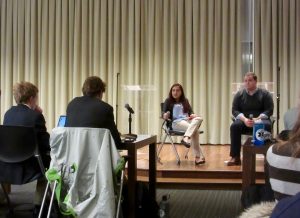On Monday, Feb. 15, with just three days before the election, Reed Howard (SFS ‘17) and Courtney Maduike (SFS ‘17) launched their write-in campaign for the GUSA Executive. The Voice sat down with them for a conversation about their candidacy and their goals.
This interview has been edited and condensed for clarity.
The Voice: What does your running mate bring to the table?
Courtney Maduike: I think Reed’s best strength is there is no one else on this campus that knows the Campus Plan as well as he does. Hearing him get so impassioned and moved by how the Campus Plan needs to have a student voice to make sure students have a positive Georgetown experience, he just comes to life. Additionally, he is one of the warmest people that I’ve come across. There are so many people who are superficially warm but seeing people come up to him and talk to him and seeing how people have just been so eager to support our campaign because of their care for him. Those relationships and that genuine care for the person is one of his best individual qualities.
Reed Howard: One of my favorite things about Courtney is she’s so authentic with you; you get the same Courtney you have in one situation in any other situation. And I think that’s one thing our generation really craves is authenticity, and it’s so hard to come by. Throughout the campaign and just from knowing Courtney, she’ll just have a conversation with someone and be their support system by the end of that short conversation, without any expectation of anything else. She’s just doing that out of the goodness of her heart. I also think that knowing her background and what she’s done on campus, she’s a fighter and passionate about the things that she cares about. And I think that is what is going to make her an incredible vice-president.
TV: So you’ve said before that you had to mobilize people pretty quickly and that that was one of your strengths that you had, but why did you decide to join the race so late and only announce on Monday?
CM: So, Reed and I had actually been in conversation last semester about deciding to run for GUSA, and he approached me with the idea, and initially I laughed.
RH: She was like, “Are you crazy?”
CM: I was like, “GUSA is this body. I don’t do politics. I don’t do this…” When he first approached me, I just laughed because I thought it was comical, but then I gave him the opportunity to explain himself, and explain his train of thought and why he wanted to run and why he specifically wanted to run with me. Right from the bat, I said, “I’m not saying this is a no, and I’m not saying this is a yes, but the things that I care about on this campus are issues of diversity, and elevating the student voice.” For various reasons, we decided mutually that it was best to just suspend the campaign and step out of the race. After dealing with all the politics behind the scenes, not even just between us, but with the formation of tickets and formation of campaign staffs and those things, I came to understand why students hate GUSA. It’s because of all the politics and pettiness behind the scenes that the rest of the student body doesn’t even see.
Then, coming back this semester and seeing that the other ticket, Chris and Enushe’s ticket, wanted a united Georgetown … that’s a beautiful vision if that’s what you believe, [but] seeing this united ticket that didn’t give students an option for who they wanted to represent them in raising their voices with students’ concerns on campus became more personal. And I felt more injustice towards it when it came out that Enushe was taking the internship on Wall Street. That’s fine, kill it girl, Goldman Sachs is a great internship to get, especially women in finance, but for me what made it controversial is that there’s no one to challenge that. There’s no one to challenge them to think about what they’re doing on campus because there’s only one ticket. … Coming back to that idea of wanting to run was much more of a rapid process and that’s why we were able to mobilize and act quickly and fold out our plan.
RH: I couldn’t have said that better. I also think … I really know the role of the GUSA Executive well. I was confident to say that even though we haven’t spent months preparing for our campaign, I still know that, on day one, I’m comfortable going in and stepping into that role. I really believe that it should be a disqualifying factor for you not to be here over the summer. For someone to not respect all of the work that goes in over the summer, and the importance of the president being on campus was so jarring to me that it really prompted me to want the students of Georgetown to have a choice in who their president would be and how they would spend their time as president advocating for students.
CM: So, long story short, we had been in conversation about this, and then decided to get back into the race. The real catalyst that prompted us to get back into the race was seeing the power vacuum that had been created and that there was no challenge to that, especially given that the existing president on that ticket wasn’t going to be on campus. We just wanted to give students an opportunity to have their voices raised.
TV: You mentioned that Enushe and Chris wanted to unite Georgetown, and you didn’t think that they were going to be able to do that. Do you believe that having a GUSA outsider and insider is inherently better than having two GUSA insiders? And what would you do that would make that more realistic and actually change the process more than they have said?
CM: I think two people alone can’t unite Georgetown. Part of the reason why I’ve come to realize why GUSA campaigns are so contentious and so heated is that the system itself is broken, and that may not be the fault of the candidates who are running. There just isn’t flexibility for additional student voices when two students are the voices of the entirety of the student body. … It takes an outside perspective to bring in new ideas and look at things in a fresh way for a shift in GUSA culture to continue, but also a shift in the perception of GUSA. We see this in Joe and Connor’s administration and their campaign and how they were able to shift the perception of GUSA, and we want to continue this transition and this progression in a positive direction for next year. Regressing back to a ticket that would be “what makes sense”… people who have been on GUSA and who could rise up in GUSA ranks and make leadership, I think would be a step backwards from what Joe and Connor have set forward.
RH: I wholeheartedly believe that the GUSA Executive should have someone who has experience in it and someone who brings in a completely outside perspective. I’ve been in GUSA meetings when it’s just full of people who have always been in GUSA, and people are always like “I don’t understand why students don’t understand why it’s so important.” I think that lack of an ability to think outside of GUSA terms is really crippling to the effectiveness of GUSA as an advocacy body. It’s absolutely essential that you bring in outside perspective, just to freshen up the dialogue and to get creative thinking.
TV: Bringing in these student voices, will you be doing this within the institutional structure that GUSA already has, or do you have a plan to change it?
RH: So, two things. One, definitely if we’re elected and we’re looking to put together a team to serve in the GUSA Executive, we’ll want to include people who have some experience and people who have outside experience. I think that’s absolutely crucial. Two, Courtney and I fundamentally believe that GUSA should act as a catalyst for student activists who are already doing incredible work on campus. Part of our message is bringing in new perspectives directly into GUSA, and the other part is taking an outward look and saying, “Hey, look, GUSA can help you get in the door. We can give you these tools. We can give you a platform. How do you want to use it?” The other is inspiring a grassroots nature to the work that’s already going on. It’s not like these things are going to be starting from scratch. The great work is already happening.
CM: The people making visible impact on this campus are the students. If we think about the changing of the names [of what are now Freedom and Remembrance Hall], if we think about the diversity requirement, if we think about the sustainability bikes project, those are students advocating for these things. What GUSA can provide them is additional resources to help them understand how they can navigate administration. It’s taking students who are passionate about these issues on campus, who are well versed about these issues on campus, because they’re the ones experiencing it. They’re the ones who are doing the work on the ground already, and strengthening their work and bolstering their platform and leverage with the administration, using GUSA as a partner and a tool.
TV: Let’s move on to your platform, or your priority list. Some of them seem a little bit difficult to implement, like “Demanding Fiscal Transparency,” ” Replacing Aramark,” or “Halting New Construction.” Some of them are hard to measure. How would you tackle these problems in a way that’s different than other GUSA executives have already tried in the past?
RH: So to the first one of those, college affordability. Students want quick change on campus, and I understand that that’s natural, but I also know from working with the administration that they play a long game, and if we’re going to be effective, students have to as well. GUSA has never pushed the administration on why tuition rates continue to rise. And I think it’s high time that we start demanding answers on that. And I’m not saying that we’re going to bring about immediate change on this topic, but we’re going to get our foot in the door, and we’re going to start that conversation … How that could actually look this year, and what we could get started on this year, is saying things like “Where are funding sources for essential services on campus coming from, where exactly is that being pulled from our tuition? What is the breakdown between how the faculty is being paid versus how the administration is being paid? Can you give us numbers on the ministry of growth?” And once you can name those certain things, you can start shaming those certain things, calling out the university in areas it needs to improve, and access calls for transparency.
CM: Despite the rising cost of tuition, there are certain services on campus that are inadequate and we need to understand why and why aren’t we pushing for these things. So things like printing and laundry services on other campuses, which are already covered in the cost of attendance, those are not currently covered on this campus, and that’s something that we can be pushing for. In addition, the current services that deal with sexual assault or mental health resources, CAPS, Student Health … processes that deal with these very sensitive issues, and resources that Georgetown has for these issues, so that they can check off the list like we have something that’s adequate for this, are not actually adequate services for students. We’re paying for these. And so, pushing for tangible things like streamlining the investigative process for sexual assault or providing more, pushing for more stuff with CAPS so that students are not on the phone for 30 minutes if they’re in dire situations. … These should be services that are given as student rights on this campus.
RH: So you asked earlier what I respect most about Courtney and one of those things is going through this process, we have a lot of ideas and things we want to include on that. And Courtney was really tough on like, can that actually happen? And if that can’t actually happen, then we’re probably just promising that so that students will vote for us, and that’s not something that we’re interested in. We’re interested only in really talking about what we can do. So I will defend what’s on [the platform] because I really believe that if GUSA stands up and we have a grassroots student movement that we can, if not accomplish them, start the ball rolling in a positive direction.
Also I just wanted to touch on two of the things that you said. One, about Aramark, the contract is ending, and we have an opportunity to go in there and find more competitive bidders and put a lot of pressure on the administration to change our food vendors. And, in that process, [we can] leverage things like expanding meal swipes for Hoya Court and other things, especially if we don’t get students’ first desire out of it. The other thing is putting a halt to construction. These are conversations that have been happening through the Georgetown Community Partnership, and I really believe that that is a logistical possibility to put in the next campus plan an understanding that before new buildings are constructed on campus, we’ll have needed renovations. Currently underway is a consultant study on the different need for generic propecia online. When that comes back, we’re going to have a lot of fuel behind calls to renovate dorms, and the neighborhood leadership also really understands the need to renovate dormitories, or residence halls, and they’re joining students to push against the administration, so I really believe that its a possibility. I just wanted to name those two things.
TV: Going back to the Sexual Assault Survey and Campaign [referenced in your budget] – what do you see as GUSA’s role when those results come back, in the next few months and the next few years?
CM: So, one of the things that GUSA has is the ability to publicize these things and make these things known. If you’re the individuals representing us to the administration, and the ones who are well-versed in these issues, there should be transparency and openness as how these these things are marketed so that students are more informed. Because, especially as an outsider who was not involved with GUSA in an immediate fashion, there’s a lot of things that were going on in GUSA that I was not aware of on campus. … That’s one thing that I think Joe and Connor did really well this year when they had that marketing push for ‘these are the things that we’ve accomplished’, things that GUSA has done. … If students have a positive perception of the current administration, it’s because they’re publicizing and they’re being transparent about what they’re doing. GUSA does a lot of work but it’s behind the scenes, students don’t see a lot of behind-the-scenes action that goes into a campaign, or administration, or a staff. Making these things visible to students is one of the greatest things that GUSA can do on this campus so that the average student is more informed.
RH: I want to touch on that and then go into policy for sexual assault just a little bit. One of the things that I remember is Nora West, who was a great activist on this campus on behalf of sexual assault, just sending out mass emails every day and being like, ‘tweet this to Provost Groves to say why we need a new Title IX Coordinator’, or ‘email this to this administrator.’ So I think that a huge role that GUSA should play is mobilizing the students. Right now, policy-wise, there’s a Sexual Assault Working Group, there’s a sexual assault policy group, and right now GUSA has really strong advocates in both of those camps that are coordinating and providing a really solid front on behalf of students. Ensuring that that coordination continues, and also noting how there’s a lot of upperclassmen in conversations, so how do we effectively bring in underclassmen so that we can have sustained activism, is incredibly important to me. Sexual assault is an absolutely crucial part for GUSA to deal with next year, Courtney and I both understand that, we both realize that. We know that we’re going be working with and using GUSA’s platform to assist the sexual assault work that incredible students on this campus are already working on.
TV: About your student activities capital campaign – one of the criticisms that has been brought is that it won’t be supported by the Office of Advancement, since they already have their own system. How do you plan to bring this into reality?
RH: I think that’s a valid point. So there’s a couple things: one, there are some structures that already exist within the Office of Advancement, and just looking down and saying, ‘hey, listen, how can we come to a closer agreement with one another?’ The other thing is it obviously is taking some money out of the hands of the university so they’re not going to like it, naturally, and what we’re going to have to do is really make the case to students that this is something that’s worth their time and energy investing in. Nothing is easy from the beginning – to start GUASFCU was not easy for students, it took a lot of creativity, and a lot of ingenuity. I think it’s really important to note that the Corp started out of the backlash against the university to protect students’ rights from the university, and so that change never comes easily. But I’m someone who’s trying to think of planting the seeds that will have big rewards in the long term and I think the Student Activities Capital Campaign would be a huge advancement for student funding on this campus, which isn’t the most flashy of topics, but I think make a long term impact for students.
TV: What are your thoughts on the very specific structure that has been set for the write-in votes tomorrow?
RH: It’s absolutely ridiculous, and here’s why: not because it’s going to be harder for people to write-in “Hot Chick and Chicken Madness” or “Reed and Courtney,” but the fact that a student would take their time to vote and maybe they’ll write in just our first names and then their vote would not be counted, is disrespectful to the idea that we’re trying to listen to the student voice on campus. I’m not even saying that it makes it harder for us for votes to be tallied, because, honestly, at the end of the day, that’s not my number one concern. My number one concern is not us winning, but that the students’ voice gets heard. For the Election Commission to throw out a bunch of people’s votes is completely inconsistent with GUSA’s goal with representing the students’ voices.
CM: For the Election Commission to dismiss the case that we made not only by ourselves, but also by Joe and Connor and other students trying to get us on the ballot, as us being “unhappy with the turnout” is disrespectful and insulting to students who have opinions. To dismiss it as something that was “a concern for hurt feelings,” isn’t taking into account the case that we were making. However, the Constitutional Council, even if it wasn’t the decision we wanted, the care and dedication and the effort that they put into a 3-page response explaining to us why [was fair]. Now, I think students have accepted us as a write-in candidate, we’ve accepted that we’re a write-in candidate, and we’re marketing ourselves as write-in candidates, educating students about how they can go about that process.
RH: I think something that you guys can expect is that we’ll request a recount, not necessarily because we want to make sure that we have the best chance, but because we want to make to make sure that each students’ vote is counted and their voice is heard.
TV: You’ve mentioned Joe and Connor a couple of times, how would you assess their administration throughout the past year?
RH: I think Joe and Connor have been very important for Georgetown because they’ve been real and down-to-earth. It’s been important for the people in GUSA to take themselves less seriously. You can take the work seriously but you shouldn’t take yourself seriously. When they were running, their platform was fun and a joke except for Sexual Assault and Mental Health, and their gains in both those fields have been incredible for students. And I think it’s really important that you know what the GUSA Exec is going to prioritize once they’re in office. We’ve represented that in our very specific and tight platform that we’ve put forward, and I think that’s an important model for GUSA campaigns in the future.
CM: One of the critiques I would say is that as a result of wanting to bring in more voices there are was a long laundry list of things that touch on various areas but didn’t actually have tangibles that they were going to keep pushing for. There are certain positions that don’t know what they’re doing day-to-day, how they can be effective. For instance, the Secretary of Diversity. Just hearing [the secretary] talk about what is expected of her, there isn’t a day-to-day delivery of what she needs to do or even a week-to-week. “Diversity” is such a big issue, it makes it difficult for students to actually be in the conversation. If you’re just brought into the room just for the sake of being in the room, then you’re just checking off the laundry list rather than trying to implement change.
TV: Can you give us 2-3, maybe 4 sentences about why you should be elected? Why are you the better ticket?
CM: Reed and I together bring in extensive knowledge from within the GUSA framework, but also extensive knowledge and experiences from outside of GUSA. Two people who are inside of GUSA and have been since their freshman year cannot change GUSA because you’re operating under the framework of how GUSA already operates. Bringing the relationships and leadership that we have outside and our experiences working with the administration to get things accomplished on campus will allow us to continue to shift the culture and perception of GUSA to make it operate on campus as an advocacy group and not as a perceived student government that is exclusive to a group of self-selecting students who want to be involved in student government. We’re each a part of a student body and each of our voices are just as valuable as everyone else’s.
Additional reporting by Chris Dunn and Kevin Huggard.





